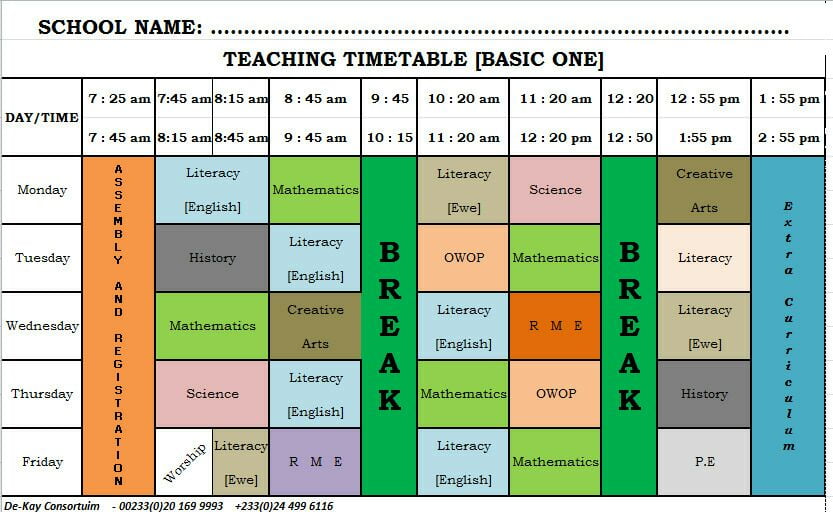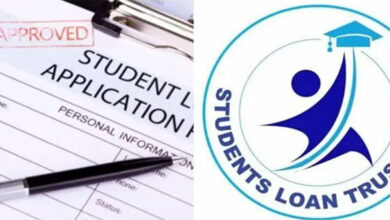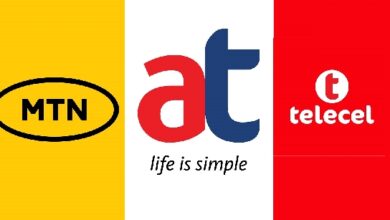Complete Overview Of The New GES Educational Reforms And The New Curriculum
Here is a complete overview of the new GES educational reforms and the new standard based curriculum and its implementation. It details what the entire new curriculum implementation workshop was about. Understanding the structure of the new curriculum. The actual reforms made, how to adapt as a teacher and download the new GES syllabus and its associated time table.
The workshop for the implementation of the new standard based curriculum at the district levels has officially come to an end. The five-day workshop started on Tuesday 13th august 2019 and ended on saturday 17th august 2019. That is basically the end of the official training on the implementation of the new GES standard based curriculum. All is now set for the actual implementation to begin in September.
The nationwide implementation of the new GES curriculum started with the training of about 150 master trainers nationwide on the new curriculum. The master trainers in turn trained about 3,900 district and regional trainers who have also trained about 152,000 KG and primary school teachers during the workshop at the district level.
As part of the implementation process, the training process will be followed by community engagement, supply of curriculum documents to schools, supply of books and relevant teaching and learning materials, monitoring and evaluation by supervisors.
This article gives a complete overview of the new GES standard based curriculum and its implementation.
Table of Contents
What Occurred At The New GES Standard Based Curriculum Workshop
The five-day workshop which started on Tuesday 13th August 2019 and ended on Saturday 17th August 2019. Was to train Kindergarten (KG) to Primary six teachers including head teachers at the various basic institutions across the country for the for the implementation of the new standard based curriculum come september 2019 when the 2019/2020 academic year begins.
The teachers where put into groups and taught how to go about the curriculum by the district trainers. They covered in detail each topic of the new syllabus one after the other making reference to the new syllabus and the resource book provided them.They went on to treat how to write scheme of work and lesson notes under the new syllabus.
For instance, features of the old lesson note which were Topic, Sub-Topic, Relevant Previous Knowledge (R.P.K), Teaching Learning Materials (TLM), Teaching Learning Activities (TLA), Core points, Evaluation etc are now replaced with Strands(Sections/Aspects), Sub-Strands(Topic), Content standards, Indicators(Objectives), Examplars (TLA).
Also instead of writing scheme of work (Now Scheme of learning (SOL)) for the academic term you would have to write for the whole academic year and detail weekly and daily forecasts.
What this means is that the old lesson notebooks cannot be used under the new curriculum implementation. Resources for the implementation including lesson notebooks are to be provided by GES by the beginning of the 2019/2020 academic year in September.
Understanding The Structure Of The New Lesson Plan
- Strands are the broad areas/sections of the subject content to be studied.
- Sub-strands are the topics within each strand under which the content is organised.
- Content standard refers to the pre-determined level of knowledge, skill and/or attitude that a learner attains by a set stage of education.
- Indicator is a clear outcome or milestone that learners have to exhibit in each year to meet the content standard expectation. The indicators represent the minimum expected standard in a year.
- Exemplar: Support and guidance, which clearly explains the expected outcomes of an indicator and suggests what teaching and learning activities could take, to support the facilitators/teachers in the delivery of the curriculum
Sample Yearly Scheme Of Work / Scheme of learning (SOL) Format

Sample Weakly Scheme Of Work / Scheme of learning (SOL) Format

Scope Of The Current Implementation Of The GES Standard Based Curriculum
In the New Standard-based curriculum, Basic Education has been redefined to include Senior High School. Therefore, the new curriculum covers pupils from the kindergarten through primary, junior high school (JHS) to senior high school (SHS).
However, implementation is to begin from kindergarten to primary six first, coming September 2019.
The Reforms Under The New Standard Based Curriculum
- Class / Basic 1,2,3 and JHS 1 and 3 wont write end of term exams. Only Class/Basic 2,4,6 and JHS 2 will write a standardized test.
- Basic school starts from KG to SHS. There will be no BECE instead WASSCE will be the only major exam at the basic level. Although there will be national standards assessment Test (NSAT) such as group work and activity based assessment at each curriculum phase.
- National Standards Assessment Test (NSAT) replaces the existing National Education Assessment (NEA), the National Early Grade Reading Assessment (EGRA) and the National Early Grade Mathematics Assessment (EGMA).
- French will be introduced from basic 4 to JHS 3.
- 1 hour compulsory extra-curricular activities (groups and clubs)
- Learning areas for kindergarten is reduced from seven (7) to four (4) thematic areas namely Numeracy, Literacy, Creative Arts and Our World Our People (citizenship).
- Number of subjects of study for Lower and Upper Primary remains the same. However, there will be fewer concepts and in-depth treatment of concept in each subject with more emphasis on literacy and numeracy.
- History of Ghana will be compulsory for each child from P1 to P6.
- PE and RME will be a standalone subjects and will be taught practically
- Teaching and Learning is going to be Learner centered instead of teacher centered with teachers being only facilitators. For instance, in teaching a concept like addition in mathematics to pupils, the teacher is not supposed to tell the student to begin adding the “ones” before moving to the “Tens” and “Hundreds”. The student is to decide how to go about it individually. The teacher is not supposed to tell the student the answer is “wrong” if the student does not arrive at the “expected” answer.
- Rote learning (chew and pour) is replaced with activity-based learning. For instance, the student is not going to be asked to state or define any concept. Instead, for a concept such as history of a place, the students would have to visit the place on a field trip and when evaluating the student, the student would have to sketch the visited place instead of recalling memorized names and history of the place.
- Emphasis on learner-centred pedagogy by emphasizing on the principles of differentiation, scaffolding and use of ICT as a pedagogical Tool.
- Emphasis on inclusion and diversity
- A focus on the 4Rs – Reading, wRiting, aRithmetic and cReativity . It is expected that at the end of each progression phase of the curriculum, learners would be offered the essential learning experiences to progress seamlessly to the next phase. In cases where there are indications that alearner is not sufficiently ready for the next phase a compensatory provision through differentiation would be provided to ensure that such a learner is ready to progress. The progression phases are: pre-primary (KG1 – KG2), primary (B1 – B3 and B4 to B6), junior high (B7 – B9) and senior high (SHS1 – SHS3).
Detailed Subjects To Be Taken At The Basic Level
Kindergarten (KG)
- Literacy
- Numeracy
- Creative Arts
- Our World and Our People
Primary 1 To Primary 3 (Basic 1 – Basic 3)
- Literacy (English & Ghanaian Language)
- Numeracy
- Science
- Creative Arts
- History
- RME,
- Our World and Our People (Citizenship Education, Agriculture, Computing, Geography)
- Physical Education.
Primary 4 To Primary 6 (Basic 1 – Basic 3)
- Literacy (English, GhanaianLanguage & French)
- Numeracy
- Science
- Creative Arts
- History
- RME
- Our World and Our People (Citizenship Education Agriculture, Geography)
- Computing
- Physical Education
Junior High School (Basic 7- Basic 9)
- Literacy [Gh. Lang, Eng. Lang Arts.,French or Arabic]
- Mathematics
- Science
- History
- Geography
- Our World & Our People (Religion and Moral Education, Civics, Agriculture and Geography)
- Creative Design and Technology (Visual Arts, Home Economics, PreTech)
- Computing (with emphasis on Application)
- Physical Education
Weekly Subject Periods / Contact Hours For Primary / Time Table
- Literacy (English and Gh. Lang.) 15 Periods
- Mathematics 10 Periods
- Science 4 Periods
- Creative Arts 4 Periods
- History 4 Periods
- RME 2 Periods
- PE 2 Periods
- OWOP 4 Periods
- French 2 Periods
- Computing 2 Periods
- Worship 1 Period
Summary
- 10 Periods per Day
- 30 Minutes per Period
- 1 hour to be allocated to extra curricular activities at Primary Schools
- Total of 50 periods per week
Sample New GES Syllabus Time Table
GES New Syllabus Time Table Primary (Basic) 1

GES New Syllabus Time Table Primary (Basic) 2

GES New Syllabus Time Table Primary (Basic) 3

GES New Syllabus Time Table Primary (Basic) 4

GES New Syllabus Time Table Primary (Basic) 5

GES New Syllabus Time Table Primary (Basic) 6

Core And Elective Subjects For Junior High School
Core Subjects for Science and Technical Programmes
- English Language
- Mathematics
- Ghanaian Language (Optional)
- History
- Geography
- Computing (with emphasis on Application)
- Core Subjects for Language Arts, Humanities, Business,
Vocational Programmes
- English Language
- Mathematics
- Ghanaian Languages (Optional)
- History/Geography
- Science including Agriculture
- Computing (with emphasis on Application)
NB: A student at SHS is to select at least four and at most five subjects from not less than two groups as Electives for the final years in SHS.
The Old Objectives-Based Curriculum vs The New Standard-based curriculum
In the old objectives-based curriculum basic education started with Kindergarten, Primary (Upper and Lower) and ended at Junior high school (JHS), after which BECE was taken and upon passing the pupil progressed to Senior High School or Technical or vocational education then to Tertiary.
In the New Standard-based curriculum, Basic Education has been redefined to include Senior High School. The educational system is now sub-divided into five key phases as follows:
- Key Phase 1 (Foundation level comprising Kindergarten 1 to 2)
- Key Phase 2 (Lower Primary level comprising B1 to B3)
- Key Phase 3 (Upper Primary level of B4 to B6)
- Key Phase 4 (Junior High school level of JHS 1-3)
- Key Phase 5 (Senior High school level of SHS1- SHS3)
Differences In Subjects

In the New Standard-based curriculum there has been an introduction of two subjects at the basic level namely History (of Ghana) and Our World Our People (citizenship). Also Information and communication technology (ICT) is now called Computing. The subjects to be treated at the basic level are now as follows
English, Mathematics, Science, History, Creative Arts, Our World Our people, Physical Education
Rationale Behind The New Curriculum
On Thursday, April 11 the Ghana Education Service launched the new standard-based curriculum as part of the ongoing reforms in Ghana’s educational sector at a press briefing in Accra.
At the press briefing the Director-General of the GES, Professor Kwasi Opoku-Amankwa, made known the rationale behind the new standard based curriculum and what it entails to the media.
He said the Ministry of Education is embarking on the reforms at the pre-tertiary level, to make education more responsive to the human resource and development needs of Ghana. He stated that the new curriculum is to be rolled out starting the 2019/2020 academic year in September 2019.
The Executive Secretary of the National Council for Curriculum and Assessment (NaCCA), Dr Prince Armah also disclosed to the Daily Graphic that Unlike the objective-based curriculum that is cognitive development and examination-focused, the new standard based curriculum is more focused on the affective and psychomotor domains of learning and focuses on the total development of values and character of the Ghanaian child.
He made this known with the following statements:
“We need the genius, and if all we do is ‘chew, pour, pass and forget’, how can we be genius? We need skilled people to propel our economic aspirations and the school system that can help foster that is technical and vocational education.”
“We need people who are empathetic; we need people who have fellow feeling; we need people who are tolerant and these values cannot be assessed using cognitive instruments alone.
“So the development assessment framework is one that will not only measure or emphasise cognitive but also look at the values and attitudes that will make the person fit into society efficiently,”
Other Major Reasons Behind The New Curriculum
- The desire to shift the structure and content of Ghana’s education system from merely passing examinations to building character, nurturing values, and raising literate, confident, and engaged citizens who can think critically.
- The desire to address challenges in the existing curriculum and ensure that the content of the national curriculum can be internationally benchmarked.
Criticisms of The Old Curriculum Leading To Introduction Of The New Curriculum
Content Overload
The National Council for Curriculum and Assessment (NaCCA) puts it this way:
“The broader nature of our curricular present a challenge to teachers. There are far too many curricular aims to teach in the time available for teaching and testing. The result has been curricular narrowing laying out too many curricular targets.”
Over Emphasis on Passing Exams / Teaching To Test
This is also stated this way:
“inability of the assessment system to provide sufficient data on which improvements in teaching and learning can be fashioned and an overly emphasis on preparing learners to pass exams, thus teaching to test”
Poor Learning Outcomes
The massive failure rate by students who partake in the major examinations such as the BECE and WASCE.
Stake Holders Of The New Curriculum and Its Implementation
Consultations for the new standard based curriculum started in 2017. Consultation was made with stakeholders such as the Ministry of Education, directors of Education, the Parliamentary Select Committee on Education, heads of schools, faith-based organisations and institutions, teacher unions, civil society organisations, teachers and parents.
Development partners, such as the Japan International Cooperation Agency (JICA) user agencies, the British Department for International Development (DFID), the World Bank, UNICEF, the United Kingdom government, the United States Agency for International Development (USAID), among others.
Conceptual Framework of the new Curriculum

Curriculum Implementation Principles
- Inclusion
- Development of key/core competencies
- Integrated and coherent teaching and learning
- School-level autonomy and flexibility
- Responsibility and accountability
Values Of The Curriculum
- Respect
- Diversity
- Equity
- Commitment to achieving excellence
- Teamwork & Collaboration
- Truth & Integrity
CORE COMPETENCIES IN THE REVISED CURRICULUM
- Critical thinking and Problem-solving
- Communication and Collaboration
- Creativity and Innovation
- Cultural Identity and Global Citizenship
- Digital Literacy
- Leadership and Personal Development
Conclusion
Download The New GES Syllabus For All Subjects Here
Download GES New Syllabus All Subjects
Download The New GES Syllabus For All Subjects Here
Read Also
Register For NTC Licensure Exams September 2019
Here is a step-by-step guide to register for the September 2019 licensure exams.
Ghana Passport Application Procedures And All Details: Updated 2019/2020
Application Procedures and All there is to know about the various Ghana passport application methods. Read more
GES Aptitude Test 2019 / 2020 Full Details and Topic Areas
All you need to know about the GES recruitment aptitude test 2019 /2020.Read more












wow… I can’t belief you created a site without a “search bar”. I mean how do you expect people to search for articles with just the keywords?
How many home works and class exercises should be given to basic three…. For all the subjects
Please Can I get the old curriculum
Pls may I get a tabulated differences between the old basic school curriculum n the new basic school science curriculum?